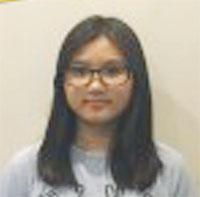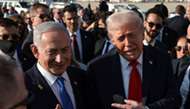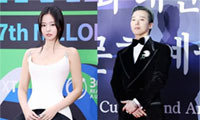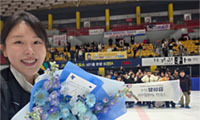How Asian Representation in Hollywood as Changed Throughout

Grace Baek / Portola 12th Grade
Asian actors were often pigeonholed into narrow and limited roles that rarely reflected their actual experiences and instead serviced white stories or stereotypes.
For example, actor Randall Park played the role of a doctor several times in his career, including Curb Your Enthusiasm and The Bold and the Beautiful.
“The roles weren’t super offensive,” says Park. “But when you look back and realize how many doctors you play, you think, O.K., that’s how they see us.”
The disparities are worse for Asian women in particular, who have often been flattened into two-dimensional characters lacking agency or written as sex objects, whether stereotypically submissive or cunning. In Sex and the City (1998), an Asian housekeeper was looking to sabotage her male boss’s relationship for her own sexual gain. The Lotus Blossom trope, which symbolizes feminine, shy, fragile, and sexually submissive characteristics, is epitomized in Miss Saigon (1989) and Memoirs of a Geisha (2005).
This conception of Asian women has been deeply rooted in American history, dating back to 1875 when the immigration of East Asian women was prohibited as they were seen as prostitutes and bearers of disease.
Nonetheless, gradual change has been taking place in Asian American storytelling all across film and television. Over the past decade, Asian Americans have become directors, producers, and showrunners, forming tight-knit groups to champion each others’ stories.
Thus, as a new wave of stories arrives, Hollywood is shifting away from what Asian-American actor Awkwafina calls “the mirage of diversity” and more towards lasting forms of representation.
From The Farewell (2019) to the Japanese-American internment-camp horror series The Terror (2018), Asian stories are being portrayed in a more authentic light than ever.
Films and series starring Asian women as protagonists, such as Crazy Rich Asians (2018), To All The Boys I’ve Loved Before (2018), and Never Have I Ever (2020) reveal fresh perspectives without reinforcing harmful stereotypes.
“While it is important to have a wider variety of Hollywood and media depictions of Asian Americans, greater representation and visibility is not the solution to racism,” associate professor of communication studies Dr. Stephanie Young said.
“We need to critically examine the ways in which the ‘model minority’ rhetoric is problematic.”
This representation in Hollywood is crucial to shaping narratives that bleed into reality, and further humanizes the diversity of Asian experience beyond the screen.
<Grace Baek / Portola 12th Grade>
스마터리빙
more [ 건강]
[ 건강]이제 혈관 건강도 챙기자!
[현대해운]우리 눈에 보이지 않기 때문에 혈관 건강을 챙기는 것은 결코 쉽지 않은데요. 여러분은 혈관 건강을 유지하기 위해 어떤 노력을 하시나요?
 [ 건강]
[ 건강]내 몸이 건강해지는 과일궁합
 [ 라이프]
[ 라이프]벌레야 물럿거라! 천연 해충제 만들기
 [ 건강]
[ 건강]혈압 낮추는데 좋은 식품
[현대해운]혈관 건강은 주로 노화가 진행되면서 지켜야 할 문제라고 인식되어 왔습니다. 최근 생활 패턴과 식생활의 변화로 혈관의 노화 진행이 빨라지고
사람·사람들
more
“취미생활로 다진 친목… 선후배들과 만든 모교사랑”
사진러브한인 사진 동호회 사진러브(회장 크리스 고)는 13일 용수산에서 송년모임을 갖고 한 해를 마무리하는 뜻깊은 시간을 가졌다. 이날 모임에…

[홀인원] 이상원 박사
일반외과 전문의 이상원(왼쪽) 박사가 지난 9일 뉴포트비치 소재 골프장 9번 홀(152야드)에서 레스큐 클럽으로 친 샷이 그대로 홀에 빨려 들…
[송년행사 게시판] 재미시인협회
재미시인협회(회장 지성심)는 오는 20일 오후 4시 가든스윗호텔에서 한 해를 마무리하며 동인지 ‘외지’ 제35집 출판 기념회와 ‘제23회 재미…
[송년행사 게시판] 향군단체 연합
6.25 참전유공자회와 대한민국 육군협회 등 남가주 지역 향군 단체 연합은 19일 오전 11시30분, 용궁에서 송년 행사를 개최한다. 드레스코…
[송년행사 화보] “이웃과 함께 나누고 지인과 함…
KYCC13일 윌튼 플레이스 초등학교에서 열린 ‘한인타운청소년회관(KYCC) 홀리데이 카니발’이 성황리에 막을 내렸다. 올해는 KYCC 창립 …
많이 본 기사
- 엡스타인파일 공개 후폭풍…법무부 ‘트럼프 삭제’ 의혹 선긋기
- ‘SNS검증’ 美비자심사 지연에…빅테크, 또 직원 출국자제 권고
- 美, 우크라戰 종전 중재 속도…마이애미서 우크라·러 연쇄회동
- 美, 베네수 연안서 유조선 추가 나포…긴장 또 고조될 듯
- 위성락 “내년부터 농축·재처리·핵잠 한미협의 동시다발 진행”
- ‘열애설→결별설 겪은’ 제니·지드래곤, 단둘이 ‘MMA’ 대상 쓸어갔다
- 신민아♥김우빈, 결혼식날 전한 깜짝 소식..3억 기부한 예비 부부
- 트럼프, ‘바이든 임명’ 직업 외교관 출신 대사들 대거 소환
- ‘부상 아웃 공식 확정’ 이강인, 절뚝일 때부터 이상했다 “왼쪽 허벅지 근육 이상”... 폼 최고였는데 아쉬워
- 美·이집트 등 4개국, 가자 평화구상 진전·후속조치 논의
- [건강포커스] “밤에 더 자주 깨는 어르신, 다음 날 인지수행 능력 떨어져”
- ‘미소천사’ 김아랑, 너무도 진솔했던 ‘은퇴 이유’ 고백 “경기 후 아쉬움 아닌 고마움 들어 결심했다”
- 젤렌스키 “우크라 선거 방식, 푸틴이… 1
- 교황, 전세계 추기경 바티칸 소집…내달 7∼8일 첫 회의
- 최화경 화가 개인 작품전시회
- 개명 하루만에 케네디센터 외벽에 ‘트… 1
- ‘유세방불’ 트럼프 “관세가 물가 올… 1
- 요르단 “美 시리아 IS 공습에 참여…안보 위협 저지”
- 尹 김건희특검 첫 조사 8시간 반 만에 종료…6개 혐의 모두 부인
- 신민아♥김우빈, 결혼식 날 웨딩 사진 첫 공개..눈부신 투샷
- “스페이스X, 상장 주관사 선정 착수…모건스탠리 유력”
- ‘손예진♥’ 현빈, 학부모 모드ON.. “아들이 배우 한다면? 하..” 한숨
- 쿠팡 주주, 美법원에 집단소송… “정… 1
- 조이풀여성합창단, 실버타운 데이케어 위문공연
- ‘새댁’ 함은정, 결혼식 하자마자..내조의 여왕
- 구글, 검색결과 크롤링 업체 상대 소송…AI 경쟁사 견제 의도
- 시민권 박탈 착수⋯매달 200명 1
- 尹 소환한 김건희특검, ‘명태균 의혹’부터 6가지 혐의 순차 추궁
- ‘이젠 SD 송성문’ 3루엔 ‘3억 5000만 달러’ 마차도 버티는데... 단장이 답했다 “다양한 역할 소화할 것”
- “루비랑 데이트”..송혜교의 따뜻한 … 1
- 대북제재 완화 시그널… 이 대통령, … 1
- 해군, 트럼프 ‘황금함대’ 새 전함 … 1
- 아마존, 칩 조직 통합 개발사 본격 변신 포석
- 안세영, ‘천적’ 야마구치도 넘었다…역대 최다승까지 단 한 걸음
- [업계] 12월 내내 크리스마스 특별 메뉴 출시
- ‘80세’ 선우용여, 대세 유튜브 수… 1
- 각국 AI 패권 경쟁 본격화… 5조달러 시장 선점 총력
- 법무부, ‘엡스타인문건’ 공개…정재계 추가 연루 증거 나올까
- 오바마케어 보조 확대 연장 종료 유력
- 뉴욕-뉴저지 다리· 터널 통행료 또 오른다
- 퀸즈장로교회 ‘사랑의 바구니’130개 이웃에 전달
- “네타냐후, 트럼프 만나 ‘이란 추가 타격’ 설명 계획”
- 美, 베네수 마두로 압박 강화…처제·동서·조카 무더기 제재
- ‘김혜성도 넘었다’ 6년 120억 결… 1
- 위기의 트럼프 “내년봄 최대규모 세금환급”
- 파워볼 1등 잭팟 15억 달러로 치솟아
- 與 “내란 2차 종합 특검해야”…국힘 “통일교 특검이 국민 명령”
- 이 대통령 “피도 눈물도 없는 금융사… 1
- 테라폼랩스 파산관재인, 테라 가격부양 금융사에 수조원대 소송
- 기아 미국법인, 2026년형 ‘K4 … 1
1/5지식톡

-
 ☝️해외에서도 가능한 한국어 선생님…
0
☝️해외에서도 가능한 한국어 선생님…
0이 영상 하나면 충분합니다!♥️상담신청문의♥️☝️ 문의 폭주로 '선착순 상담'만 진행합니다.☎️ : 02-6213-9094✨카카오톡ID : @GOODEDU77 (@골뱅이 꼭 붙여주셔야합니다…
-
 테슬라 자동차 시트커버 장착
0
테슬라 자동차 시트커버 장착
0테슬라 시트커버, 사놓고 아직 못 씌우셨죠?장착이 생각보다 쉽지 않습니다.20년 경력 전문가에게 맡기세요 — 깔끔하고 딱 맞게 장착해드립니다!장착비용:앞좌석: $40뒷좌석: $60앞·뒷좌석 …
-
 식당용 부탄가스
0
식당용 부탄가스
0식당용 부탄가스 홀세일 합니다 로스앤젤레스 다운타운 픽업 가능 안녕 하세요?강아지 & 고양이 모든 애완동물 / 반려동물 식품 & 모든 애완동물/반려동물 관련 제품들 전문적으로 홀세일/취급하는 회사 입니다 100% …
-
 ACSL 국제 컴퓨터 과학 대회, …
0
ACSL 국제 컴퓨터 과학 대회, …
0웹사이트 : www.eduspot.co.kr 카카오톡 상담하기 : https://pf.kakao.com/_BEQWxb블로그 : https://blog.naver.com/eduspotmain안녕하세요, 에듀스팟입니다…
-
 바디프렌드 안마의자 창고 리퍼브 세…
0
바디프렌드 안마의자 창고 리퍼브 세…
0거의 새제품급 리퍼브 안마의자 대방출 한다고 합니다!8월 23일(토)…24일(일) 단 이틀!특가 판매가Famille: $500 ~ $1,000Falcon: $1,500 ~ $2,500픽업 & 배송직접 픽업 가능LA…
케이타운 1번가
오피니언
 한영일 / 서울경제 논설위원
한영일 / 서울경제 논설위원[만화경] 웰다잉 인센티브
 캐슬린 파커 워싱턴포스트 칼럼니스트
캐슬린 파커 워싱턴포스트 칼럼니스트 [캐슬린 파커 칼럼] 아이들을 온라인에서 보호하기
 양상훈 수필가ㆍ시인
양상훈 수필가ㆍ시인 [한국춘추] 경제대공황ㆍ제2차 세계대전 승리로 극복한 루스벨트 리더쉽

[왈가 왈부] 고환율에 외환 건전성 완화·서학개미 규제… 미봉책 아닌가요
 수잔 최 한미가정상담소 이사장 가정법 전문 변호사
수잔 최 한미가정상담소 이사장 가정법 전문 변호사 [수잔 최 변호사의 LIFE &] AI 시대 편리함에 안주하지 말자
 김도년 성균관대 건축학과 교수 스마트도시·건축학회장
김도년 성균관대 건축학과 교수 스마트도시·건축학회장 [로터리] 지멘스가 만드는 미래 동네
1/3지사별 뉴스

퀸즈장로교회 ‘사랑의 바구니’130개 이웃에 전달
퀸즈장로교회가 18일 크리스마스를 앞두고 교인들의 정성과 사랑이 듬뿍 담긴 ‘사랑의 바구니’ 130개를 소방서와 경찰서, 요양원, 선교회, 그…
시민권 박탈 착수⋯매달 200명

“이웃 돌보는 여러분이 동역자”
워싱턴성광교회(담임목사 임용우)는 18일 한인단체와 소방서‧도서관 등에 총 2만9천 달러의 성금을 전달했다. 지난 2011년부터 15년째 지역…
소기업 지원에 1천만 달러 투자

위기의 트럼프 “내년봄 최대규모 세금환급”
트럼프 대통령은 17일 “취임 1년 만에 우리는 누구도 상상하지 못한 성과를 이뤄냈다”고 말했다.트럼프 대통령은 동부시간 이날 밤 9시부터 백…
[새해부터 이렇게 달라진다] 최저임금 또 오르고… 유급 병가는 더 확대

오늘 하루 이 창 열지 않음 닫기 




















































.png)


댓글 안에 당신의 성숙함도 담아 주세요.
'오늘의 한마디'는 기사에 대하여 자신의 생각을 말하고 남의 생각을 들으며 서로 다양한 의견을 나누는 공간입니다. 그러나 간혹 불건전한 내용을 올리시는 분들이 계셔서 건전한 인터넷문화 정착을 위해 아래와 같은 운영원칙을 적용합니다.
자체 모니터링을 통해 아래에 해당하는 내용이 포함된 댓글이 발견되면 예고없이 삭제 조치를 하겠습니다.
불건전한 댓글을 올리거나, 이름에 비속어 및 상대방의 불쾌감을 주는 단어를 사용, 유명인 또는 특정 일반인을 사칭하는 경우 이용에 대한 차단 제재를 받을 수 있습니다. 차단될 경우, 일주일간 댓글을 달수 없게 됩니다.
명예훼손, 개인정보 유출, 욕설 등 법률에 위반되는 댓글은 관계 법령에 의거 민형사상 처벌을 받을 수 있으니 이용에 주의를 부탁드립니다.
Close
x